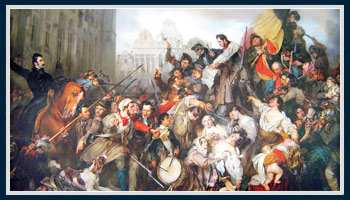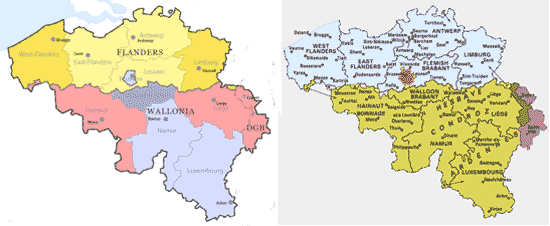 Having gone for months without a government, the Belgian crisis looks set to kick off once again. French speakers and Flemish speakers really just don’t seem to get on, and are increasingly objecting to being forced to share the same country. Indeed, as anyone who has ever been to Brussels – which is in the Flemish part of the country – will know, if you try to speak French to a Flemish-speaker, you’re liable to end up with an earful of abuse. To outsiders it can all seem rather confusing – I mean, hell, it’s only Belgium, right? As anyone who’s ever visited the place will know, although the countryside is pretty enough (and the beer and food is aces), there’s really not that much worth fighting over – Belgium has more often than not been used as a staging-post for wars aiming to claim other, more interesting territories. Rarely has it been the prize that has been sought.
Having gone for months without a government, the Belgian crisis looks set to kick off once again. French speakers and Flemish speakers really just don’t seem to get on, and are increasingly objecting to being forced to share the same country. Indeed, as anyone who has ever been to Brussels – which is in the Flemish part of the country – will know, if you try to speak French to a Flemish-speaker, you’re liable to end up with an earful of abuse. To outsiders it can all seem rather confusing – I mean, hell, it’s only Belgium, right? As anyone who’s ever visited the place will know, although the countryside is pretty enough (and the beer and food is aces), there’s really not that much worth fighting over – Belgium has more often than not been used as a staging-post for wars aiming to claim other, more interesting territories. Rarely has it been the prize that has been sought.
So what’s worth getting so het up about? The confusion only deepens when you realise that the problem dates back more than 2,000 years…
Belgium has always been an artificial creation – and one with little in the way of a coherent history. It started out as part of the Roman province of Gallica Belgica (named after the Belgae tribes of the region, whom Julius Caesar thought among the most brave of those he helped conquer), formed in 22 BC following thirty years of on-off rebellions and Germanic invasions and even then made up of two distinct linguistic/racial groups, the belligerent Germanic tribes in the north and the more Romanised Celtic Latin speakers in the south.
But the real clincher came under Emperor Domitian in c.90 AD – Gallica Belgica was restuctured, with the part largely corresponding to modern-day Belgium being named Germania Inferior. The inferiority complex has arguably remained ever since – the area more often under the rule of others than independent.
After three hundred years of relative peace under the Romans (albeit heavily militarised peace, as this was border country) being shattered by the arrival of the Vandals and Burgundians in 406, becoming part of the heartland of the Frankish Merovingian and then Carolingian empires. Modern day Belgium was still but a part of a greater whole, with no identity of its own.
Then came the split – the division of Charlemagne’s Holy Roman Empire that followed the Treaty of Verdun of 843. Now, rather than just being part of a larger whole, what is now Belgium became two even smaller parts of two far larger wholes – a situation only worsened when, in 862, the County of Flanders became part of the new country of France, the rest of what is now Belgium remaining in the Holy Roman Empire. Despite being nominally part of France, Germanic languages began to dominate in northern Flanders, while Latinate languages continued to be the norm in the south for much of the medieval period.
900 years on from Julius Ceasar’s initial Roman conquest, there was still no sign of Belgium – but the language division was firmly entrenched. When the two parts of modern Belgium were reunited as part of the Bergundian Netherlands in the early 15th century, they found they had little in common – and continued to feel that way until the Pragmatic Sanction of 1549, when they were divided once again during the reorganisation of the Seventeen Provinces.
Did the Belgians have any say in any of this? Of course not – they still didn’t exist.
Meanwhile, the Reformation kicked in and – as in so many parts of Europe – caused further divisions, the Flemish/Germanic north turning Protestant, the French/Latinate south remaining Catholic [* see comments*]. The northern part joined the newly-formed Dutch Republic, the south the Spanish Netherlands – and the dividing line of this political/religious schism ran right through good old Belgium, neatly positioning it as one of the central battlefields and staging grounds of first the Eighty Years War, then the overlapping Thirty Years War, swiftly followed by the War of Devolution, the Franco-Dutch War, the War of the Grand Alliance, the War of the Spanish Succession, the War of the Austrian Succession, the Seven Years War, the French Revolutionary Wars and the Napoleonic Wars. Along the way, the region’s rulers (usually French, Spanish, Dutch or Austrian) changed too often to keep track of, and it played host to at least two of the battles that helped define modern Europe, Ramillies and, of course, Waterloo.
After Napoleon’s defeat, Belgium was included as part of the newly-created United Kingdom of the Netherlands – which was so united it lasted a mere 15 years until the oft-forgotten Belgian Revolt created that fun little country that plays host to the European Union. Why was there a revolt? Well, because having been under French rule from 1795-1815, the French-speaking Catholic south didn’t much like suddenly being ruled by the Protestant Dutch again.
The Belgian Revolt remains a hugely confusing affair, thanks largely (as far as I can tell) to a combination of revolutionary fervour and Dutch over-reaction, rather than just the southern, French, Catholic bit of Belgium ending up independent, parts of the Flemish Protestant north [* see comments*] split off as well. It seems rather like a one-night-stand that ended up in marriage – albeit a marriage that has lasted 178 years so far, and weathered countless more wars passing through the country’s borders (that declaration of neutrality made back in 1830, it seems, not doing them much good).
And there we have it. Like all European countries, Belgium is an accidental construct of centuries of conflict, only this time one where the accident is continuing to create real problems thanks to the harsh cultural/linguistic divide between north and south that was already in evidence back in the time of the Romans. Just check out the map of the Belgian elections from last year (left) and the Flemish/French linguistic divide (right), and it becomes all too obvious – a picture telling a thousand words and all that (almost literally, in this case – I’m about 30 words over…):

Plus, of course, the irony value of even so small a country as Belgium – a country that even by Europe’s standards has experienced more than its fair share of warfare, conflict and persecution – not being able to stay united while playing host to the various institutions of a European Union which of course aims to unite a far larger and far more divided area packed with far more languages and far more past conflicts, is not lost on me… It makes it at once the most and the least appropriate place to house the (majority of the) EU institutions going. Unless we can relocate them to the Balkans…
Update: Here you go, the stupidity of Belgium personified. I present the town of Baarle-Nassau. Surely this has to be one of the most convoluted fixed national border situations in the world?

 Having gone for months without a government,
Having gone for months without a government, 

 Now
Now  Instead, I’ve decided to start writing about things that still interest me when the political goings on are getting tedious. Keeping in with the general theme of this place – and giving an excuse to make that little piece of paper with “MA Modern History (Dist.)” and those three years working on a history magazine seem worthwhile – what better than European history and culture? After all, I know my stuff moderately well, am always reading to find out more, and in recent months have most enjoyed writing posts like the
Instead, I’ve decided to start writing about things that still interest me when the political goings on are getting tedious. Keeping in with the general theme of this place – and giving an excuse to make that little piece of paper with “MA Modern History (Dist.)” and those three years working on a history magazine seem worthwhile – what better than European history and culture? After all, I know my stuff moderately well, am always reading to find out more, and in recent months have most enjoyed writing posts like the